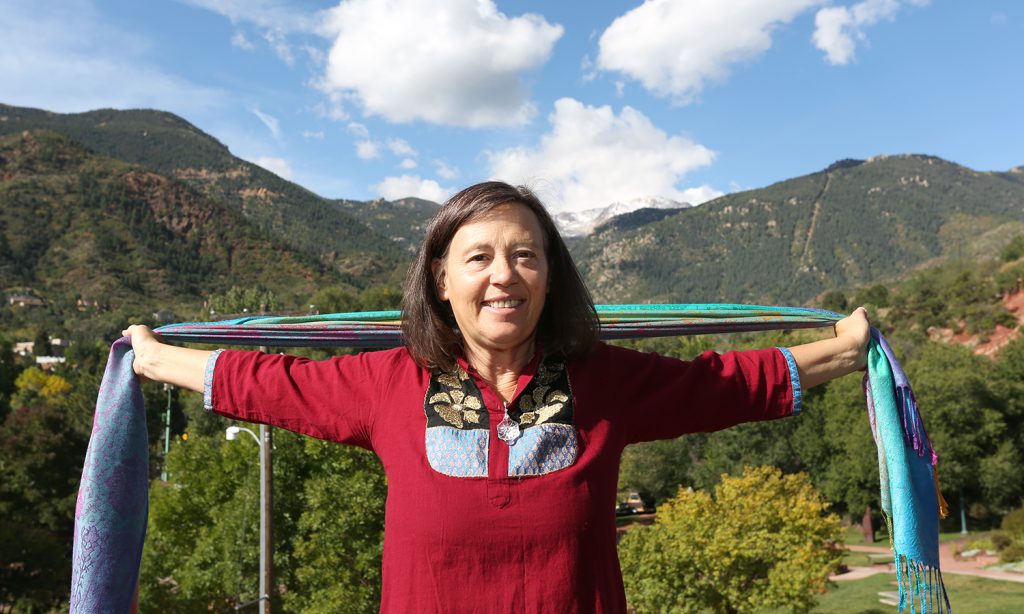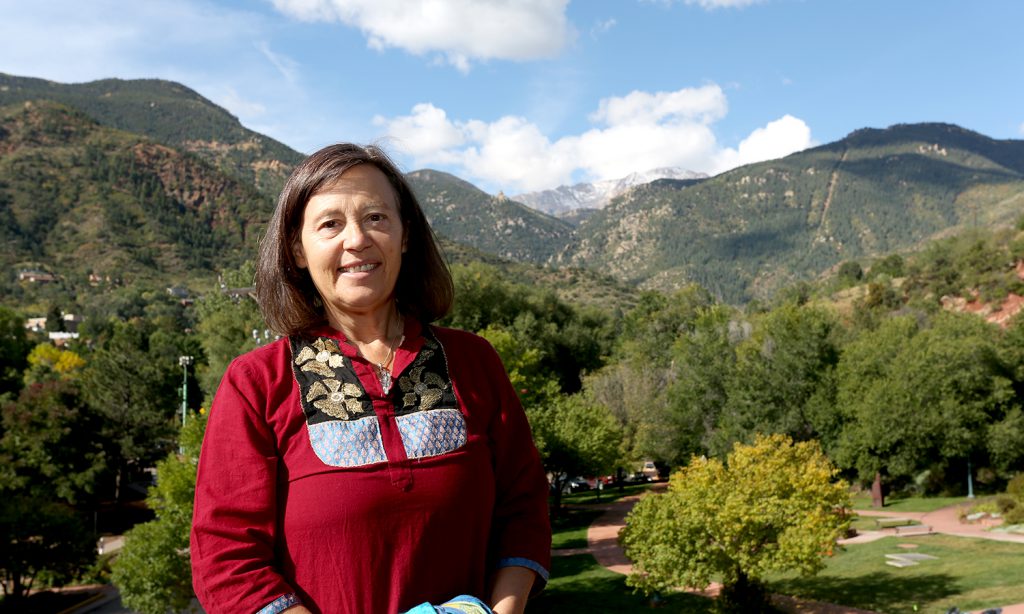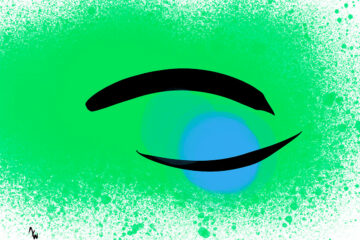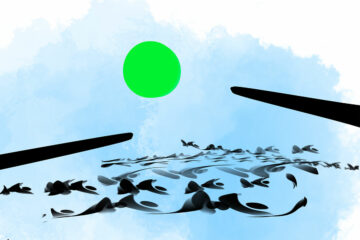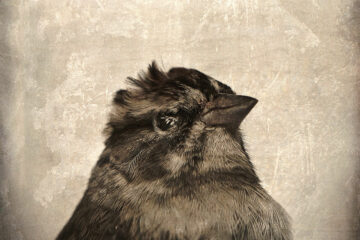Kat Tudor often is described as the visionary behind SunWellness (SunWater Spa, SunMountain Center, Smokebrush Foundation). But the vision runs so much longer and deeper than these relatively new SunWellness expressions of her vision in Manitou Springs.
Having moved to the Colorado Springs area in 1973 to attend Colorado College, Kat stayed and has been an artist, teacher, healer, performer, and connector of many dots in the creative and healing arts since.
During an hour-long soak in one of the cedar tubs at SunWater Spa, Kat shared her insights on many experiences and ideas within the the realm of creativity and spirituality.
In this, the first piece of a two-part Q&A, we cover the healing arts, native teachings, Manitou Springs’ cosmic significance, and the special waters that flow through it all. [Read part two, “Kat Tudor | Yoga + the Vibration of Truth.”]
Humanitou: What does “healing arts” mean?
Kat: I would say the healing arts are all the arts, because I think that making art is in and of itself healing for a human being and healing for the planet. But in particular I’ve been practicing yoga and bhakti yoga, which is devotional yoga, and Thai yoga, which is hands-on healing.
I think much sickness comes when energy is trapped, when things aren’t flowing, so you start making art and expressing yourself. You don’t have to keep the dam in and it’s healing to make something.
It’s almost always good for you, good for whoever you live with. You made something yourself, you don’t have to blame them for some lack that you have. I just feel that all the arts are healing.
Bringing people together here in community is healing. Having people experience these waters again in the way that they’ve been traditionally used is, I think, is good for all of us. The more that people come to this spa and leave more peaceful, that’s surely healing for our community, right?
Humanitou: How do you balance being so engaged in community, art and business?
Kat: I make something every day. It may be a painting. It may be a sculpture. It may be a workshop. It’s something.
Someone who has the need to create as much as I do, imagine if I didn’t. So, it’s a blessing for all the beings around me that I’m able to express myself constantly with making things.
Because otherwise you keep it bottled up. I might be yelling at you or being grumpy, or causing more problems in our world.
Humanitou: What does Manitou mean to you?
Kat: I’m so connected to the waters. My connection is very deep and emotional, like water.
The water here that you’re soaking in was considered by the Utes to be the water most infused with lunar energy. That’s feminine, that’s emotional, that’s water. They considered these waters to be very healing on all levels: emotional, physical, psychological, all levels.
I feel very connected to the ancient ones here who worked with these waters, and have tried to receive their blessings and their guidance in what I’m doing here.
The Tabergauche were the Northern Ute tribe that lived here and they were the ones that protected the water. We are in touch with the Tabergauche tribe, which now is in Utah. They were driven from this land to Utah.
And we’ve had all the water blessed. We’ve worked with their medicine women and their teachers, their dancers, their singers. So, my connection, I would say, is very visceral and very ancient. I don’t think this is my first time soaking in these waters in Manitou.
These waters in Manitou Springs are considered the most sacred in North America by many tribes. But what we didn’t have was real access to being in the water. So, that was when SunWater Spa was born.
There are many Mayan legends about this place. There are many Egyptian prophecies. There are many yogic beliefs.
That mountain [Tava / Pikes Peak] is believed by the Maya to be a crystal pyramid and, of course, it is. It is believed to be a place where space ships get their energy. Many people see life up there from all over the place.
It receives its power from the sun. These waters receive their power from the sun. They go through the crystals, they come out, that’s what you’re soaking in. That’s why all these butterflies are all around here. To bring the water back, to bring the life back here to Manitou, which is these waters. It’s our blood, it’s our sacred river.
Humanitou: And that is how SunWater came to be?
Kat: SunWater Spa came about because I was in Rishikesh, India, which is in the foothills of the Himalaya. It’s a very sacred city. It’s known for its healing traditions from centuries back.
I was there with Don Goede, who is my partner in SunWater, and he mentioned to me repeatedly, “Don’t you think Rishikesh is just like Manitou?” They just have a very similar feel, a similar vibration.
One day he said, “Rishikesh is just like Manitou, except we don’t have the Ganges.”
And I realized we do have the Ganges. These waters are considered the most sacred in North America by many tribes. But what we didn’t have was real access to being in the water.
So, that was when SunWater was born. We do have the Ganges, that kind of water that people will come from all over to experience, because it’s so healing.
Humanitou: When did your learning, your connection to these things begin?
Kat: I started doing yoga when I was 11 years old. I was living in Atlanta and I found a book called “Yoga, Youth and Reincarnation.” How I found that in Atlanta in the Sixties I have no idea, but I did and I started reading and practicing from that book.
It was a tiny book with little tiny photographs and drawings. I would look at them and try to do the yoga. But I was far more interested in the spiritual teachings in that book.
I found that book again at Poor Richards, and have since read it and thought, “How lucky you are to have had such a great first teacher in those arts.”
I also grew up in the Cherokee homeland. I am part Cherokee. From the earliest times I’ve been suffused with Cherokee lore, the Cherokee names, the Cherokee medicine.
I studied when I was at Colorado College. There were some Indian monks who came to be in residence there and they taught yoga everyday for a couple of semesters. So I studied with some very direct lineage to India.
And then I’ve continued. I’ve always been a teacher. I’ve taught art, dance, drama, writing, many combinations of the above, to all ages. I now like to teach mentally and physically disabled people.
But I studied intensively in India, Peru, all over Europe and in Mexico, and have been studying directly with Miguel Angel Vergara one-on-one for many, many years.
I now lead retreats with him to the Yucatan and other places to study Maya yoga, to learn the legends, go to the sacred places, do ceremony and learn yoga. They have yoga, too. All the traditions have yoga.
The language of the Maya, the language of the Ute have a common root, they are very similar. The legends are identical, just have different names and slightly different nuances.
I do learn from books, but I learn more from poetry than I do from prose. I feel like, for me, I learn best from being in the presence, learning from the source.
Humanitou: Was there family influence in your learning about the arts, creativity, spirituality?
Kat: Pretty much any time I encounter a seer or a psychic, a teller, the first thing they say to me is, “Oh, you’re not from this planet.”
One day, somebody walked into my house and explained to me that I had come here from the stars to live in a very materialistic family so that I could teach them a lot about the dimension of space, of stars, and that I had come to learn my lessons from that experience.
If passion comes from your heart and is love for your fellow being, and it has some truth to it, passion is like a fire burning. It helps you create.
I would say I was so lucky I grew up on a farm. I learned from the animals. I had a wonderful teacher, very yogic. She’s 95 years old. She taught me a lot. She couldn’t read or write, but she taught me everything I needed to know, to be kind to people and animals, don’t ever speak bad things about people.
She taught me all the important lessons. I don’t always follow them exactly, but I haven’t had a more pure teacher than that.
Humanitou: You grew up in the Cherokee homeland.
Kat: I grew up on a farm outside Chattanooga, Tennessee. Chattanooga, a Cherokee name. Their tribal lands were just outside my farm. I grew up finding arrowheads and there was a Cherokee graveyard in my backyard.
Practically every place name in that area is a Cherokee word. I believe that just saying those words, kind of like kirtan, kind of like chanting, just saying those Cherokee words — Chickamauga, Chattanooga, Suwanee — all those words have a vibration and open you up to the learning.
I was constantly saying some word in Cherokee just reading road signs. It was in the soil.
Humanitou: Seemingly, a side-project question I like to ask is: What does the word “passion” call to mind?
Kat: I think that passion without love is very dangerous. Passion denotes an intensity of feeling, a kind of dialing up of your emotion. If that passion comes from your heart and is love for your fellow being, and it has some truth to it, passion is like a fire burning. It helps you create.
But I believe, if your passions are stirred and they are connected to your opinions, and they are connected to a low vibration, there are some low passions. There are some low ways to vibrate that can make you feel very passionate and very strong and very angry.
I would say passion, you’re turning a dial, so I hope it’s guided by love. I hope that that passion is guided by creation. I think it’s what I said to you earlier when I said, if I didn’t create all the time, I do have a lot of passion, what if it was turned to negativity?
I think people with a lot of passion have the ability to stir people. It’s a balance. Passion? Yes. Your fire? Yes. But guided by love and balanced with being responsible for what you do with that passion.
 This Humanitou conversation is cross-posted at PeakRadar.com. | PeakRadar.com is the Pikes Peak region’s cultural calendar and digital cultural center, connecting residents and tourists with our vibrant arts community. Your source for what’s happening is PeakRadar.com!
This Humanitou conversation is cross-posted at PeakRadar.com. | PeakRadar.com is the Pikes Peak region’s cultural calendar and digital cultural center, connecting residents and tourists with our vibrant arts community. Your source for what’s happening is PeakRadar.com!
